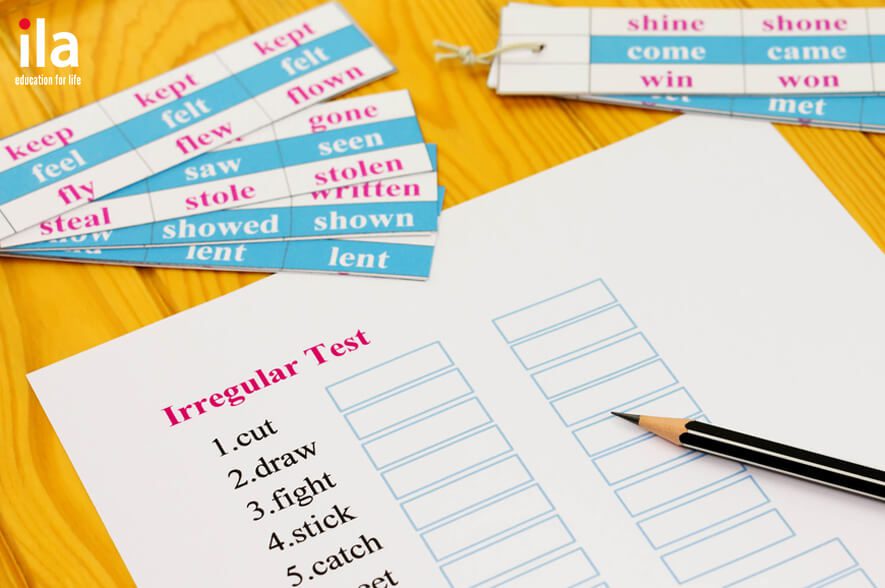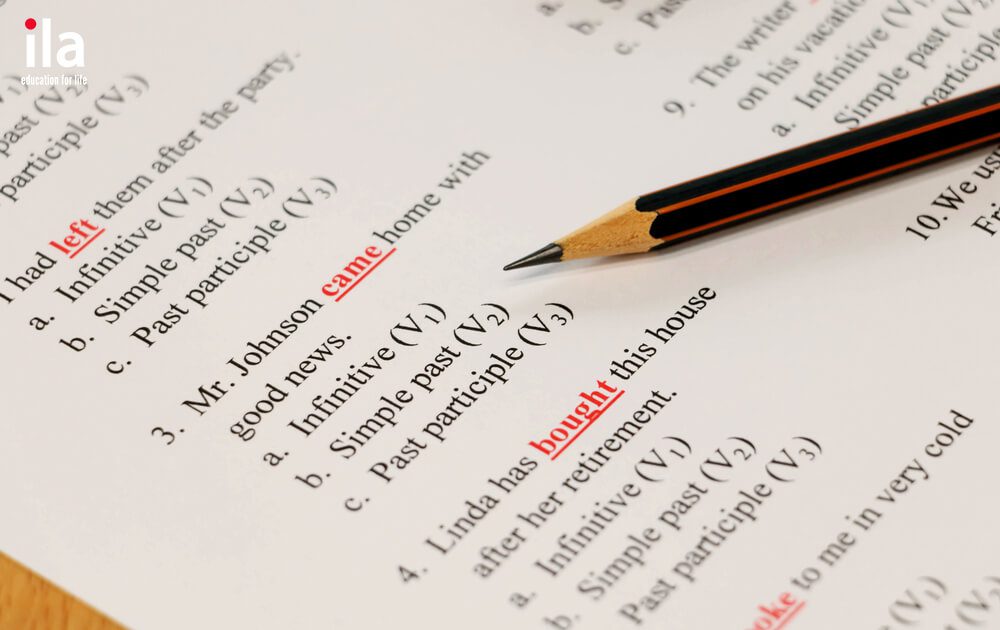The Irregular Verbs Table for 6th Grade is an essential resource to help students avoid the “headache” of conjugating irregular verbs. But how can you effectively memorize the most common irregular verbs? The ILA will share some useful tips to help you learn them efficiently.
Common Irregular Verbs
Verbs are words that express actions, frequency, or states of being. Most sentences in English require a verb.
The most basic form of a verb is the infinitive. In addition, verbs have two other key forms: past simple and past participle. The past participle form is sometimes used as an adjective.
Mastering the basic irregular verbs chart is a crucial requirement for excelling in English. First, you need to distinguish between regular verbs and irregular verbs.
1. Regular Verbs
Regular verbs follow a predictable pattern when forming their past tense. To change a regular verb from its base form to the past tense, you simply add -d, -ed, or -ied as a suffix.
Examples: 6 common regular verbs
|
Infinitive |
Vietnamese meaning |
||
|
agreed |
agreed |
đồng ý |
|
|
copy |
copied |
copied |
sao chép |
|
like |
liked |
liked |
thích |
|
hate |
hated |
hated |
ghét |
|
jump |
jumped |
jumped |
nhảy |
|
walk |
walked |
walked |
đi bộ |
Helpful Tips:
• If a verb ends in -e, simply add -d to form the past tense.
• If a verb does not end in -e, add -ed.
• If a verb ends in -y, replace -y with -ied when forming the past tense. Example: apply – applied – applied
2. Common Irregular Verbs
In addition to regular verbs, English has a large number of irregular verbs that do not follow standard conjugation rules.
Irregular verbs are sometimes referred to as “strong verbs.” Some of the most frequently used and strongest irregular verbs include go, get, say, see, think, make, take, come, and know.
Below are examples of common irregular verbs in sentences:
• Go get your brother. It’s time to eat breakfast.
• I want to build a sandcastle like the one we built last year.
• I awoke to find that a spider had bitten me. Although the wound didn’t bleed, it itches terribly.
All the bolded words above are common irregular verbs. Simply put, if a verb does not follow the -d, -ed, or -ied pattern when forming the past tense, it is considered an irregular verb.
3. A Complete List of 100 Common Irregular Verbs
|
Infinitive |
Past Simple |
Past Participle |
Vietnamese meaning |
|
awake |
awoke |
awoken |
tỉnh thức |
|
be |
was, were |
been |
là |
|
beat |
beat |
beaten |
đánh |
|
become |
became |
become |
trở thành |
|
begin |
began |
begun |
bắt đầu |
|
bend |
bent |
bent |
bẻ cong |
|
bet |
bet |
bet |
cá cược |
|
bid |
bid |
bid |
trả giá |
|
bite |
bit |
bitten |
cắn |
|
bleed |
bled |
bled |
chảy máu |
|
blow |
blew |
blown |
thổi |
|
break |
broke |
broken |
vỡ, gãy |
|
bring |
brought |
brought |
mang |
|
broadcast |
broadcast |
broadcast |
phát sóng |
|
build |
built |
built |
xây dựng |
|
burn |
burnt/burned |
burnt/burned |
cháy |
|
burst |
burst |
burst |
vỡ òa |
|
buy |
bought |
bought |
mua |
|
can |
could |
could |
có thể |
|
catch |
caught |
caught |
nắm lấy |
|
cling |
clung |
clung |
bám vào |
|
choose |
chose |
chosen |
chọn |
|
come |
came |
come |
đến |
|
cost |
cost |
cost |
tiêu tốn/giá |
|
creep |
crept |
crept |
trườn, bò, leo |
|
cut |
cut |
cut |
cắt |
|
deal |
dealt |
dealt |
thương lượng |
|
dig |
dug |
dug |
đào (hố) |
|
do |
did |
done |
làm |
|
draw |
drew |
drawn |
vẽ |
|
dream |
dreamt/dreamed |
dreamt/dreamed |
mơ |
|
drive |
drove |
driven |
lái xe |
|
drink |
drank |
drunk |
uống |
|
eat |
ate |
eaten |
ăn |
|
fall |
fell |
fallen |
ngã, rơi |
|
feel |
felt |
felt |
cảm thấy |
|
fight |
fought |
fought |
chiến đấu |
|
find |
found |
found |
tìm kiếm |
|
fly |
flew |
flown |
bay |
|
forbid |
forbade |
forbidden |
ngăn cấm |
|
forget |
forgot |
forgotten |
quên |
|
forgive |
forgave |
forgiven |
tha thứ |
|
freeze |
froze |
frozen |
đông lạnh |
|
get |
got |
got/gotten |
có được |
|
give |
gave |
given |
cho |
|
go |
went |
gone |
đi |
|
grow |
grew |
grown |
lớn lên, mọc |
|
hang |
hung |
hung |
treo |
|
have |
had |
had |
có |
|
hear |
heard |
heard |
nghe |
|
hide |
hid |
hidden |
che giấu, trốn |
|
hit |
hit |
hit |
đánh |
|
hold |
held |
held |
cầm, nắm |
|
hurt |
hurt |
hurt |
làm đau đớn |
|
keep |
kept |
kept |
giữ |
|
kneel |
knelt/kneeled |
knelt/kneeled |
quỳ gối |
|
know |
knew |
known |
biết |
|
lay |
laid |
laid |
đặt, để |
|
lead |
led |
led |
dẫn dắt |
|
learn |
learned/learnt |
learned/learnt |
học |
|
leave |
left |
left |
bỏ đi |
|
lend |
lent |
lent |
cho mượn |
|
let |
let |
let |
cho phép |
|
lie |
lay |
lain |
nằm |
|
lose |
lost |
lost |
đánh mất, thua |
|
make |
made |
made |
làm, thực hiện |
|
mean |
meant |
meant |
nghĩa là |
|
meet |
met |
met |
gặp gỡ |
|
pay |
paid |
paid |
trả tiền |
|
put |
put |
put |
đặt, để |
|
read /ri:d/ |
read /red/ |
read /red/ |
đọc |
|
ride |
rode |
ridden |
cưỡi |
|
ring |
rang |
rung |
gọi điện |
|
rise |
rose |
risen |
tăng lên |
|
run |
ran |
run |
chạy |
|
say |
said |
said |
nói |
|
see |
saw |
seen |
thấy, nhìn |
|
sell |
sold |
sold |
bán |
|
send |
sent |
sent |
gửi |
|
show |
showed |
showed/shown |
trình diễn |
|
shut |
shut |
shut |
đóng |
|
sing |
sang |
sung |
hát |
|
sink |
sank |
sunk |
chìm |
|
sit |
sat |
sat |
ngồi |
|
sleep |
slept |
slept |
ngủ |
|
speak |
spoke |
spoken |
nói |
|
spend |
spent |
spent |
chi tiêu |
|
stand |
stood |
stood |
đứng |
|
stink |
stank |
stunk |
bốc mùi |
|
swim |
swam |
swum |
bơi |
|
take |
took |
taken |
lấy |
|
teach |
taught |
taught |
dạy |
|
tear |
tore |
torn |
xé |
|
tell |
told |
told |
kể |
|
think |
thought |
thought |
nghĩ |
|
throw |
threw |
thrown |
ném |
|
understand |
understood |
understood |
hiểu |
|
wake |
woke |
woken |
đánh thức |
|
wear |
wore |
worn |
mặc |
|
win |
won |
won |
chiến thắng |
|
write |
wrote |
written |
viết |
|
wrote |
Examples of Common Irregular Verbs in Use
• She told me she had sent an important email, but I haven’t seen it.
• Yibo drew a beautiful picture in class.
• Finally, I found someone I love.
Tips for Memorizing Common Irregular Verbs
To effectively memorize the 6th-grade irregular verbs list, you can categorize the most common irregular verbs into groups as follows:
1. Verbs That Stay the Same in V1, V2, and V3
Examples:
• Bet – bet – bet
• Cut – cut – cut
• Hurt – hurt – hurt
2. Verbs Where V1 and V3 Are the Same
Examples:
• Come – came – come
• Run – ran – run
3. Verbs Where V2 and V3 Are the Same
Examples:
• Hang – hung – hung
• Hear – heard – heard
4. Verbs Where V2 Ends in “ay” and Changes to “aid” in V3
Examples:
• Say – said – said
• Lay – laid – laid
5. Verbs Where V1 Has the Vowel “i,” V2 Changes to “a,” and V3 Changes to “u”
Examples:
• Begin – began – begun
• Drink – drank – drunk
6. Verbs Where V1 Ends in “ow,” V2 Changes to “ew,” and V3 Ends in “own”
Examples:
• Know – knew – known
• Grow – grew – grown
Additionally, you can learn irregular verbs alphabetically. Try learning five verbs per day, using them in sentences, memorizing them through songs, and practicing by writing sentences daily. With consistent effort, you’ll quickly master the most commonly used irregular verbs.
Irregular Nouns
In addition to common irregular verbs, English learners also need to study irregular nouns.
Nouns make up the majority of vocabulary in most languages, including English. A noun can refer to a thing (book), a person (Queen Elizabeth II), an animal (cat), a place (London), a quality (softness – the state of being soft), an idea, or an action (quickness – the state of being quick).
1. Regular Nouns
Regular nouns follow a standard pattern when forming the plural. To change a regular noun into its plural form, you typically add -s, -es, or -ies as a suffix.
Examples:
|
Singular |
Plural |
Nghĩa tiếng Việt |
|
cake |
cakes |
cái bánh |
|
dog |
dogs |
con chó |
|
flower |
flowers |
bông hoa |
|
lady |
ladies |
quý cô |
|
wish |
wishes |
điều ước |
Helpful Tips:
• For nouns ending in -ch, -sh, -s, -ss, -x, -z, and -o, add -es to form the plural. Example: fox → foxes (a fox)
• For nouns ending in -y preceded by a consonant, drop the -y and add -ies. Example: baby → babies (a baby)
• For all other nouns, simply add -s to form the plural.
2. Irregular Nouns
Nouns that do not follow the standard pluralization rules above are called irregular nouns.
30 Common Irregular Nouns
|
Singular |
Plural |
Vietnamese meaning |
|
aircraft |
aircraft |
phi cơ, máy bay cỡ nhỏ |
|
analysis |
analyses |
sự phân tích |
|
bacterium |
bacteria |
vi khuẩn |
|
basis |
bases |
sự cơ bản |
|
cactus |
cacti/cactus/cactuses |
xương rồng |
|
child |
children |
trẻ em |
|
crisis |
crises |
cuộc khủng hoảng |
|
criterion |
criteria/criterions |
tiêu chuẩn |
|
datum |
data |
dữ liệu |
|
deer |
deer/deers |
con nai |
|
dwarf |
dwarves/dwarfs |
quỷ lùn |
|
fish |
fish/fishes |
con cá |
|
foot |
feet |
bàn chân |
|
fungus |
fungi |
nấm |
|
goose |
geese |
con ngỗng |
|
half |
halves |
một nửa |
|
hypothesis |
hypotheses |
giả thuyết |
|
index |
indices/indexes |
chỉ số |
|
larva |
larvae/larvas |
ấu trùng |
|
loaf |
loaves |
ổ bánh mì |
|
man |
men |
đàn ông |
|
matrix |
matrices/matrixes |
ma trận |
|
mouse |
mice |
chuột, chuột nhắt |
|
oasis |
oases |
hòn đảo |
|
phenomenon |
phenomena/ phenomenons |
hiện tượng |
|
quiz |
quizzes |
câu đố |
|
scarf |
scarves/scarfs |
khăn choàng |
|
self |
selves |
bản thân |
|
sheep |
sheep |
con cừu |
|
thief |
thieves |
kẻ trộm |
|
tooth |
teeth |
răng |
|
vortex |
vortices/vortexes |
dòng xoáy |
|
wharf |
wharves/wharfs |
cầu cảng |
|
wife |
wives |
người vợ |
|
wolf |
wolves |
con sói |
|
woman |
women |
phụ nữ |
|
fight |
fought |
fought |
|
find |
found |
found |
|
fly |
flew |
flown |
|
forbid |
forbade |
forbidden |
|
forgot |
forgotten |
|
|
forgive |
forgave |
forgiven |
|
freeze |
froze |
frozen |
|
get |
got |
got/gotten |
|
gave |
given |
|
|
go |
went |
gone |
|
grow |
grew |
grown |
|
hang |
hung |
hung |
|
have |
had |
had |
|
hear |
heard |
heard |
|
hide |
hid |
hidden |
|
hit |
hit |
hit |
|
hold |
held |
held |
|
hurt |
hurt |
hurt |
|
kept |
kept |
|
|
kneel |
knelt/kneeled |
knelt/kneeled |
|
know |
knew |
known |
|
lay |
laid |
laid |
|
lead |
led |
led |
|
learn |
learned/learnt |
learned/learnt |
|
leave |
left |
left |
|
lend |
lent |
lent |
|
let |
let |
let |
|
lie |
lay |
lain |
|
lose |
lost |
lost |
|
make |
made |
made |
|
mean |
meant |
meant |
|
met |
met |
|
|
pay |
paid |
paid |
|
put |
put |
put |
|
read /ri:d/ |
read /red/ |
read /red/ |
|
ride |
rode |
ridden |
|
ring |
rang |
rung |
|
rise |
rose |
risen |
|
run |
ran |
run |
|
say |
said |
said |
|
see |
saw |
seen |
|
sell |
sold |
sold |
|
send |
sent |
sent |
|
show |
showed |
showed/shown |
|
shut |
shut |
shut |
|
sing |
sang |
sung |
|
sink |
sank |
sunk |
|
sit |
sat |
sat |
|
sleep |
slept |
slept |
|
speak |
spoke |
spoken |
|
spend |
spent |
spent |
|
stand |
stood |
stood |
|
stink |
stank |
stunk |
|
swim |
swam |
swum |
|
take |
took |
taken |
|
teach |
taught |
taught |
|
tear |
tore |
torn |
|
tell |
told |
told |
|
think |
thought |
thought |
|
throw |
threw |
thrown |
|
understand |
understood |
understood |
|
wake |
woke |
woken |
|
wear |
wore |
worn |
|
win |
won |
won |
|
wrote |
written |
Along with frequently used irregular verbs, here are some examples of how common irregular nouns are used in sentences:
• He has perfect teeth. He never has to go to the dentist.
• A chef may have several knives in his kitchen, but he has one particular knife that he prefers to use most often.
• The town was experiencing multiple crises at once after being hit by three natural phenomena in a row: first a hailstorm, then a tornado, and finally, a flood.
Common Irregular Verb Exercises
1. Fill in the blanks with the correct irregular verb in the past simple tense
Yesterday, Alan did many things.
1. He (wake) up at 9 a.m. and he (draw) some plans.
2. He (split) some wood and he (bend) some metal.
3. He (dig) some holes and he (build) a fence.
4. He (cut) his finger and he (swear) loudly.
5. He (quit) working and he (feed) his dog.
6. He (spill) the dog food and then he (sweep) the floor.
7. He (let) the cat out and then he (hang) out with some friends.
Answers:
1. woke / drew
2. split / bent
3. dug / built
4. cut / swore
5. quit / fed
6. spilled (spilt) / swept
7. let / hung
2. Fill in the blanks with the correct irregular verb in the present perfect tense
Lisa has had a busy day. She has done many things.
1. She has (took) a shower and she has (make) coffee.
2. She has (run) in the park and she has (hear) birds singing.
3. She has (met) her neighbor and she has (ride) the subway.
4. She has (become) sick and she has (go) to the hospital.
5. She has (see) her doctor and she has (hold) her son’s hand.
6. She has (pay) for a hot dog and she has (buy) some shampoo.
7. She has (give) a hug.
Answers:
1. taken / made
2. run / heard
3. met / ridden
4. become / gone
5. seen / held
6. paid / bought
7. given
Having a solid grasp of irregular verbs will help students achieve high scores in English exams. Above are some tips for learning common irregular verbs along with practice exercises. Keep practicing regularly!
For more details about English courses for children and to sign up for a free 2-week trial, please visit this link.







